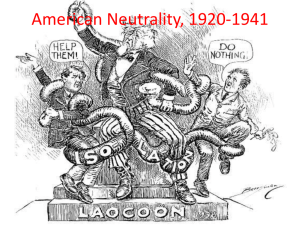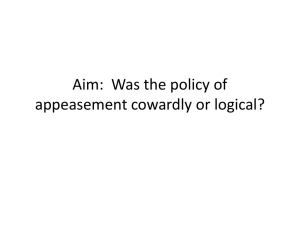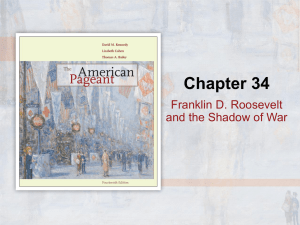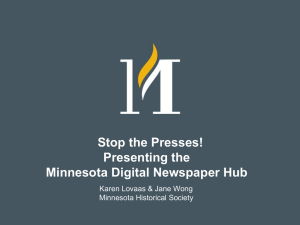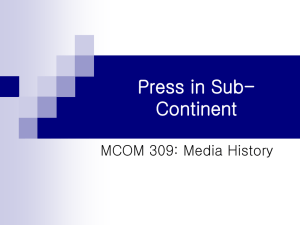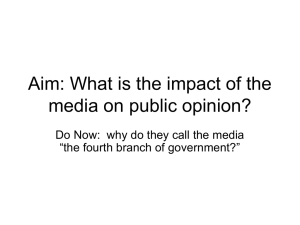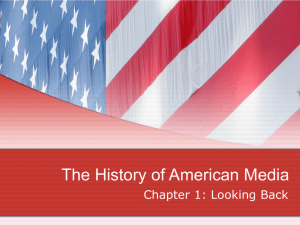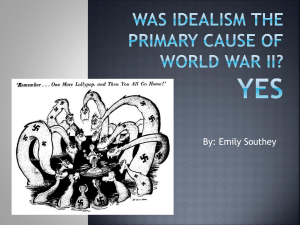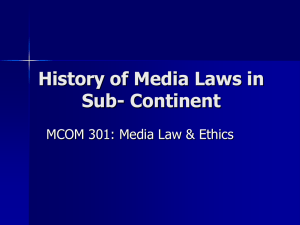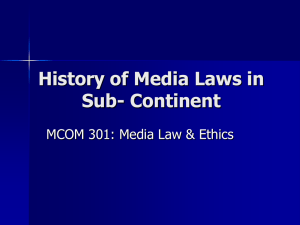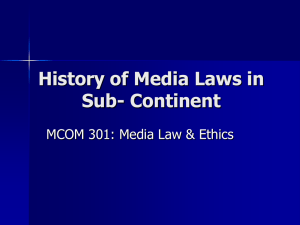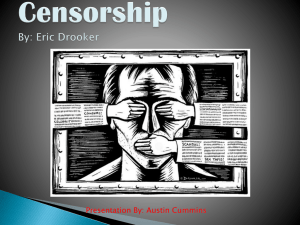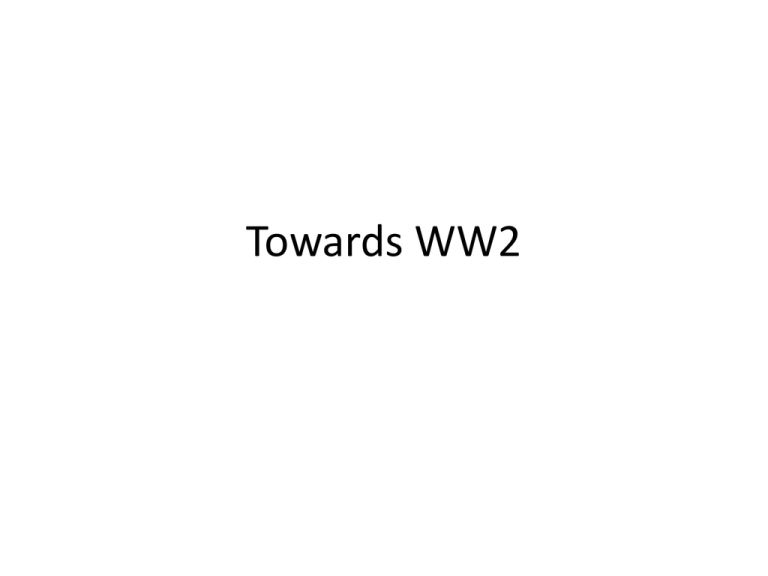
Towards WW2
Louis MacNeice, Autumn Journal
• Newspapers are part of the threat to normal
life
• Look at the poem: what does it say about
readers and their relationship to newspapers?
Changes in society 1918 - 1939
• WW1 and its aftermath – the realisation of
hundreds of thousands of young men – ‘the
lost generation’ had died
• The Communist Revolution, the rise of Stalin,
the Ukrainian famine
• The rise of Mussolini and Italian fascism
• The Great Crash followed by the Great
Depression
• The rise of Hitler and Nazism
The attitude to newspapers has
changed since 1914
• Holloway (1961) notes that a feature of post1918 literature and society is the idea that
what is most dear and precious, ‘survives
within a perimeter of threatening violence,
deeply feared and half understood’. The
newspaper, which is never ‘without its shriek
of agony from someone’ (Virginia Woolf, 1920)
is part of this menacing violence surrounding
the individual.
Poetry and Reality
• Mass Observation Bulletin, May – June 1938
• ‘Saturday May 21st. When I got down to breakfast and opened the
Manchester Guardian and read the headline I felt utterly sick with
apprehension. I couldn’t face my breakfast and had only a little stewed
fruit and some tea…
• ‘I hurried home at 12 and was relieved to see no special editions of the
evening papers out…cinema in Manchester. I dreaded seeing the newsbills
on the way in and again on leaving the cinema, as there is a growing
practice of bringing out ‘specials’ at 11 pm containing sensational news
items. To bed to dream a confused dream of wars…’Monday’s news was
much more reassuring and I felt that the danger was past. But in the
evening, listening to the Toscanini concert in a friend’s house I decided to
go upstairs to the lavatory if they listened to the news. I never listen to
the news. I am afraid of what I shall hear. A customer of mine…married,
middle class, comfortably off…said he was scared stiff all weekend…He
hadn’t dared to look in a Sunday paper but had looked at the news bills
when out in his car.’
Mass Observations: why do you read a
paper? Survey Spring 1938
• Curiosity: to be prepared for what might be about to
happen
• Sometimes I am in so much despair about the possibility of
doing this (going to war) that I can’t bear to read them for a
few days. I find though that if I am cut off from papers for a
short time I get very worried and jumpy
• Fear of calamity taking me unawares
• I like to read articles about ARP precautions and politics
• My opinion of newspapers is not very good on the whole.
They all have a bad tendency to exaggerate which often
makes timid people needlessly afraid
Literature of the 1930s
• From 1933 onwards, threat of another war became real
• Newspapers were seen as a way of getting news and being
forewarned, but also carried with them a sense of impending
disaster in a way we cannot imagine today
• Deep suspicion, particularly amongst writers of the Left that the
papers – the Times in particular, but others too, were blindly
supporting Chamberlain’s appeasement policy
• Images in late 30s literature of good journalists being neutralised;
bad journalists colluding in censorship
• Leftover suspicion of the press since WW1 – would it behave the
same again? Damning Indictment of press activities during WW1 –
Arthur Ponsonby’s Falsehood in Wartime published in 1928,
dissected and dismissed all the so-called German atrocity stories
Imminence of War
• ‘Until this year the fear of another war had
been balanced by a naïve incredulity. (‘It’s
not possible, after the hideous lesson of
1914-18, for even Hitler to risk war.’) In 1935
it began to flicker continuously, just below
the horizon, a lightening flash, a sudden
thinning of the clouds, another flash,
another.’ (Storm Jameson, from her
autobiography Journey from the North 1984:
333)
Dog Beneath the Skin and Ascent of F6
• Auden and Isherwood – Auden had already
written ‘Beethameer’ poem
• In the light of fears of the imminence of
another war and hangover from WW1
reporting – what are these two extracts saying
about journalism?
The British Press and Appeasement
• British papers enjoyed unmatched circulation
• Radio in its infancy still: newspapers were the only way
people got information. In the 1930s, for every 100
British families, 95 morning and 57 evening papers
were sold; on Sundays 130 papers were sold for every
100 families
• While none of the papers except the Daily Mail
supported Nazi Germany, most were reluctant to
exacerbate international affairs by adopting a hard line
towards it. Most hard line was the Daily Express and its
celebrated reporter Pembroke Stephens – until 1938
when Beaverbrook decided to support appeasement.
Appeasement facts
• Broadly speaking The Times, Daily Mail, Observer, Sunday Times, Daily
Express, Sunday Express were the most pro-appeasement papers.
• The Manchester Guardian and News Chronicle, though opposed to Hitler,
saw iniquities in the Treaty of Versailles and were suspicious of the French.
• The Daily Telegraph, Daily Herald and Daily Mirror were the most antiGerman and anti-appeasement.These papers, with news reports and
cartoons (and Low’s famous Hitler lampoons in the Evening Standard)
made relations between Chamberlain’s Government and Hitler’s regime
difficult at times, leading to Goebbels’ complaint to Lord Halifax in
November 1937 about attacks on Hitler in the British Press;
• BBC’s coverage of Europe was effectively controlled by the Cabinet.
• Churchill had enjoyed a platform for his views in the Evening Standard
from 1936 to 1938 but in April 1938 he was sacked for being out of line
with Beaverbrook, the paper’s owner.
• Churchill also had his platform in Parliament, and much of what he said in
debates was reported in the next day’s newspapers, even The Times
Images of the Times vis a vis
appeasement
• (Storm Jameson’s memoir Journey from the North): ‘The people I
loathe,’ Guy said, ‘are the Liberals. When The Times says we mustn’t
offend the Germans it’s only doing its duty as the last voice of
Queen Victoria and some distinguished bird-watcher or other. But
the Liberal newspapers make me vomit.’…Something like a ball of
blood exploded in my brain, I felt deaf and blind with fear and an
insane anger. I stammered stupidly, ‘Someone should assassinate
Hitler now.’(Jameson, 1984, p341)
• (Eric Ambler’s Novel Uncommon Danger 1936): His [Groom’s]
knowledge of foreign affairs was remarkable. The Professor, an
assiduous reader of the Times foreign page, heard for the first time
of a major crisis just past…’(Ambler, 1936, p15)
• (Stevie Smith’s Novel Novel on Yellow Paper, 1936): ‘How deeply
neurotic the German People is, oh how it goes right through and
isn’t just the leaders, like they pretend in The Times’.
More on the Times
• Storm Jameson’s novel In the Second Year (1935) The Times has
become the dictator’s mouthpiece and peddles propaganda and
lies. A prominent intellectual dissident, for example is heard, by the
narrator who is one the phone to him at the time, being murdered
by Hiller’s Special Guard. The Times announces the man’s ‘suicide’
in the following day’s paper.
• Commentators: ‘Pupils should also be asked in particular how far
was the Times scrupulous in publishing atrocity stories during the
War; and then whether it is possible to accept without reservation
the accounts of atrocities alleged to have been committed by the
Spanish rebels more recently; and finally why this newspaper is
tendentious and in what direction? (Denys Thompson, Scrutiny
Magazine, 1935)
Foreign Correspondents
• 1930s has been described by press historians
as ‘the age of the foreign correspondent’ – a
glamorous, expenses-paid life, with fine
writers bringing their personal views of the
world from various far-flung corners. George
Steer, Martha Gellhorn, Pembroke Stephens,
Norman Ebbutt.
Some actually overstepped the mark
• Some correspondents blurred the distinctions between
being neutral observer and a committed anti Nazi.
• The world of Middle and Eastern Europe in the mid
1930s was a world where spies and journalists often
seemed to be doing the same job – and the anti-fascist
ones -sometimes were.
• Dansey also had several British newspapermen working
for him, most notably Gibson of The Times, Hillard of
the Manchester Guardian and Maitland, second
correspondent in Vienna and south-east Europe for the
Daily Express (Read and Fisher, 1984, p174).
Journalists vs their papers
• While the majority of British newspapers supported a policy of
appeasement through the 1930s, many of their own
correspondents, particularly those based in Germany who could see
what was happening, had very different views, often clashing
fiercely with their editors. Correspondents Norman Ebbutt and
Pembroke Stephens were expelled from Nazi Germany, Ebbutt in
August 1937, Stephens in May 1934. F A Voigt, respected diplomatic
correspondent of the Manchester Guardian was even the target of
a German SS attempt on his life at the end of 1933. Voigt was part
of Dansey’s Z Organisation while based in Vienna in 1938 (Read and
Fisher, 1984, p184).
• See Daily Express June 2 1934, page 1: ‘My Expulsion by the Nazis –
Article about Jews that angered Hitler – Daily Express to prove its
truth.’
Desmond d’Esterre Kenton in Eric
Ambler’s Uncommon Danger, 1937
• Ambler, like Graham Greene, was fascinated by
spies, detectives and foreign correspondents
• Uncommon Danger written in 1936, ‘the year in
which Italy invaded Abyssinia, Civil War broke out
in Spain and Hitler ordered the German Army to
re-occupy the Rhineland. It was a year of yet
more refugees and of marriages arranged to
confer passports. It was also the year in which
the League of Nations was at least seen plainly to
be impotent. Those were the things that I was
trying, in my own fictional terms, to write about.’
Kenton’s character
• Not the glamorous, shady figure as described
by Graham Greene.
• Kenton is a cash-strapped freelance journalist,
working for whichever London paper will take
his stories. He ‘had never regarded himself as
a particularly courageous man. Such scenes of
physical violence as he had encountered in the
course of his work had upset both his
digestion and his mental processes’.
Kenton is always playing catch up, and
on the run from the word go
• From the prologue, the reader knows more about the plot than
Kenton. He is always one step behind the action and the reader, so
not either an able journalist or detective. Things happen to him, he
does not usually make things happen.
• He is stateless and penniless, an outsider: ‘He looked more like and
American than an Englishman, and was actually neither. His father
had come from Belfast, his mother was a Breton living in Lille…he
had just five pfenniges left in his pocket’
• ‘The Night Orient Express came in, flecked with melting snow…it
looked warm and luxurious on the inside and he was glad when it
moved out. At that moment it seemed to epitomise all the security
and comfort – bodily, financial and gastronomic – that he craved.
He wallowed in self-pity.’ (p.10)
War and the threat of war dominate
the story
• ‘There are persons who can, like undertakers,
adopt a matter-of-fact attitude towards dead
bodies; who can touch and move them, close
their eyes. Kenton was not one of those. He
had been in Spain during the worst months of
the Civil War and had seen many, too many
corpses…’ (p.38)
But is he a good journalist?
• Although his being a journalist is alluded to many times
throughout the story, he does not behave much like one.
• The villains’ explanation for killing him (slowly in a
vulcanizing tank): ‘You are a journalist and naturally
inquisitive. It is your misfortune that you stumbled on an
affair that is not yet ready for the attention of the world at
large…you have heard and seen too much.’
• But he does not actually engage in any journalism. The
closest he gets is musing: ‘Give himself up? Out of the
question. Get away to England? He had been all over that
before. There was nothing he could do except, he
concluded bitterly, write to the Times about it. He munched
his breakfast gloomily.’
End of the novel
• ‘Separated by miles of road were two cars. In the first one were
fifteen pieces of chemically-coated paper more dangerous than the
most powerful high explosive, the deadliest poison gas; fifteen
pieces of paper with a message of fear and suspicion and hatred for
millions of peasants…All that stood in the way…was a pitiful band of
three – a worried Russian, a girl, a tired journalist with a severe
headache and a gun that he didn’t know how to use.’ (Ambler,
1937, p227).
During the entire progress of the book he never actually files any copy.
He is the complete opposite of the Edwardian ‘Observer-hero’ of
the likes of Harold Spence, Wratten and Ed Malone, the narrator of
the Conan Doyle thriller The Lost World (1912).
No British newspaper with proprietorial links to the big business
behind the plot (‘Principals in London who were in a position to
influence newspaper proprietors..’(p.76) and pro-German editors,
would ever publish his story.
Munich Crisis 1938
• British Press all called for Germany to get its
way eg Sunday Times leader, March 1938:
• ‘But we have no alliance with Czechoslovakia,
no interest of our own to serve except the
remote contingency that later if Germany won
and turned to invade France we might be
fighting alone on her side without Eastern
allies…’
Anxiety
• Time of immense anxiety
• Memories of WW1 still fresh in anyone over
the age of about 30
• The idea that the press and the Government
would act together again (remember Fight to
a Finish) to produce propaganda ‘manufacture
of consent’ gained ground. How could anyone
believe anything the papers told you?
What did ordinary newspaper readers
think of the press in 1938?
• Mass observation, archives in Sussex
• Observer number five records, on the Cannon Street to Bingham
Road line, January 15- 19, 1938: Young woman reads in the Daily
Mirror an article on ‘The Way you Bath shows the Way you think’;
an elderly man reads ‘The Decline of Latin’ in The Times and then
goes to sleep; a man ‘of about 30 in a grey overcoat, no hat’ reads
French political news and the ‘Spanish War news slowly and
seriously’.
• Observer number eight records one man reading with ‘much
interest’ of a crisis in the French Government while a woman reads,
in the Express about ‘mystic practices in the Highlands’.
• Another ‘Female, lower m-c’ records that ‘of late’ she now only
reads local news because ‘the horrors of the world worry her too
much to read’ national and international news
Lack of trust
• ‘I can’t bear to read them [the papers] for a few days. I
find though that if I am cut off from the papers for a
short time, I get very worried and jumpy’ again
expresses the very contradictory relationship readers
have with their papers at this time, as does this one:
‘They all have a bad tendency to exaggerate which
often makes timid people needlessly afraid. On the
other hand however they are excellent ways of keeping
up with the news of the day.’ Another reader records:
unfortunately all that is printed is not always
true…however, forgetting these things, it would be a
very dull world if there were no newspapers.’
• Macneice’s poem again
Mr and Mrs A in Ascent of F6 by Auden
and Isherwood
• Mr and Mrs A represent the British public. Mr and Mrs A’s dialogue is
continually disturbed by the cries of newsboys, radio announcements,
dramatised newspaper leaders and the sound of the evening or morning
newspaper thudding through the letter box. Mr A declares: ‘I’m sick of the
news. All you can hear is politics, politics everywhere’ (A and I, 1936, p17)
but as soon as the evening paper is delivered, Mr A goes to fetch it and is
instantly transfixed by the story of the two expeditions to F6, one a British
party and the other led by the rival Ostnians (A and I, 1936, p64). One
minute, the newspapers bring them to the depths of despair:
• Mrs A: I read the papers; there is nothing there
• But news of failure and despair:
• The savage train wreck in the dead of night
• The fire in the school, the children caught alight…(A and I, 1936, p39)
• The next minute Mr A rushes in with the latest edition, detailing Michael
Ransom’s expedition to F6 (A and I, 1936, p39).
George Orwell’s Coming Up for Air
(1939)
• Along with other narratives of 1938 and 1939,
war is now so inevitable that, as critic Samuel
Hynes says writers move from a literature of
warning and prophecy to a ‘Literature of
Preparation’ (Hynes, 1976, p341), depicting
scenes of devastation, hospital wards full of
wounded, and rubble-strewn streets, as we
see in the second half of On the Frontier (Yet
another Isherwood and Auden collaboration)
George Bowling, Coming Up for Air
• George Bowling also has visions of what the nearfuture will bring:
• Whichever way you cross London it’s twenty miles of
houses almost without a break. Christ how can the
bombers miss us when they come?...Some quiet
morning, when the clerks are streaming across London
Bridge and the canary’s singing, and the old woman’s
pegging the bloomers on the line – zoom, whizz, plonk!
Houses going up in the air, bloomers soaked in blood,
canary singing on above the corpses.’ (Orwell, 1979,
p24)
The role of newspapers
• You can tell how close it is by the cheer-up stuff they’re talking
about it in the newspapers. I was reading a piece in the News
Chronicle the other day where it said that bombing planes can’t do
any damage nowadays. The anti-aircraft guns have got so good that
the bomber has to stay at twenty thousand feet. The chap thinks,
you notice, that if an aeroplane’s high enough the bombs don’t
reach the ground.’ (Orwell, 1979, p23)
• On his morning commute, and again on his return, newspaper
headlines (‘Legs: Fresh Discoveries’) harry him along the streets and
through the station concourse. It is another newspaper headline:
‘King Zog’s Wedding Postponed’ (Orwell, 1979, p24) that sets up
Bowling’s train of thoughts that end up in his seeking respite from
the present in the memories of his boyhood past, a pre-WW1 idyll
of peace and fishing in Lower Binfield.
T S Eliot’s Four Quartets
• He devotes a passage of the third section of Four Quartets, the Dry
Salvages, to a criticism of the modern press, evoking images of
lowbrow culture as similar to taking drugs: train passengers settle
down to their periodicals, and as they do so, like opium eaters,
‘Their faces relax from grief to relief’ (Eliot, 1944, p27). A few lines
later, he lists his complaints against the press:
• To communicate with Mars, converse with spirits
• To report the behaviour of the sea monster,
• Describe the horoscope, haruspicate or scry,
• Observe disease in signatures, evoke biography from the wrinkles of
the palm…
• …..All these are usual
• Pastimes and drugs and features of the press:
• …especially when there is distress of nations…(Eliot, 1944, pp29-30
Is this accurate in his describing a role
for the press in times of crisis?
• Readers enjoyed their horoscopes, trivial stories (the ‘sea monster’
is a reference to press fascination with the Loch Ness monster
during the interwar years) and found these things a welcome
distraction from unsettling international news, which many referred
to, like Eliot, as a ‘shriek’. One of the most popular press features at
the time was, according to 1938 respondents to the Mass
Observations investigation into newspaper reading, the ‘Plan with
the Planets’ page in the People. Several respondents cited this page
as being the reason why they bought the paper. One 40-year-old
female respondent told the investigator: “There is a man there [on
the People], an astrologer, who makes the most remarkably
accurate political forecasts. He foretells that Hitler will not make
war for at least three years” (this in the summer of 1938)
Newspapers as ‘dope’
• Other respondents happily admitted to craving
their newspaper like a drug: “I might almost say
that it might look to a casual observer as if I took
them [papers] like a drug, since I am completely
omnivorous,” admitted one. Another said: “It’s
like dope. I must have it every day to see just
what’s going on in the world.” A third evokes a
similar image as Eliot does with his distracted
passengers on the train, saying she read the
papers as they were “just something in which to
lose myself, and so shut up tiresome sights and
sounds.”
•
•
•
•
•
But readers’ relationship was more
complex and critical than Eliot gives
credit for
“Sometimes I curtail my bus ride home and walk across the fields. Then I like
nothing better than to sit in the middle of a hayfield reading [my newspaper].”
“I look through a newspaper very much in the mood in which I go out for a stroll
or light a cigarette by the front door late on a summer evening.”
“There are rather too many court reports with a sex interest, but since I read a
number of them, I am not sure that I should hold this against the paper.”
“My object in reading newspapers is to keep abreast of current national,
international and local affairs, which I place in the following classes: a) Those
which affect me directly, eg new road regulations; b) those which are merely
interesting, eg sports results…c) political events and present-day political history
eg the seizure of Austria, wars, ARP, activities of Parliament. I think I should read
more diligently here than I do, but probably do not, owing to the uneasy feeling
that the details may subsequently turn out to be incorrect as a result of deliberate
or accidental inaccuracy.”
“The Observer suffers from Blimpism. I have nothing against most papers except
the Mirror. It’s frightful. It really makes me doubt whether the freedom of the
press is such a good idea. That fascism could abolish the Mirror is the only
argument in fascism’s favour.”
• Recent historians of the press (eg Bingham, 2004)
argue that despite many newspapers’ support for
appeasement, enough details of Nazi atrocities were
published in the mainstream press to enable an
informed British public to support the War
wholeheartedly when it came. While no one would
doubt the ‘idiocy’ of much of the news coverage in the
popular press, readers were clearly able to assess for
themselves how much credence they wanted to give
articles. The events of 1939 – 1945 and the sacrifice
made by so many ‘ordinary’ men and women would
make the elitist views of Eliot and Auden appear
irrelevant and anachronistic.
The Future
• Journalists were generally perceived to have done
a much better job in WW2 than WW1. Some
individually very brave journalists risked all to tell
their stories. Radio broke the monopoly of the
newspapers and this added diversity was seen as
a good thing.
• Subsequent images of journalists and the press
would be more influenced by post ww2 writerly
despair at the world in general than at the press
in particular.

